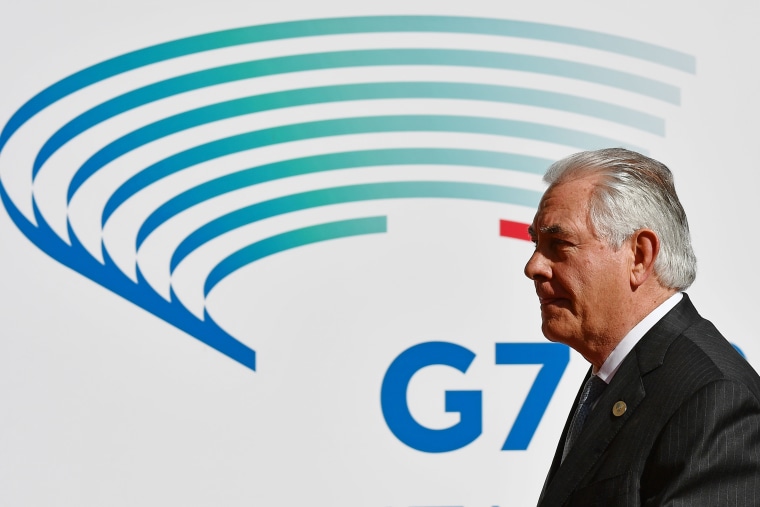MOSCOW, Russia — As the dust settles on the U.S. missile strike on Syria, only one thing is certain — Tuesday's meeting between the envoys of Presidents Donald Trump and Vladimir Putin won't be the encounter they had planned.
Secretary of State Rex Tillerson, holder of a medal of friendship from Vladimir Putin, had hoped to sit down with avuncular counterpart Sergei Lavrov to discuss Ukraine, NATO, Iran, Syria, sanctions and above all, better relations with Russia.
But that's not what's on the table in Moscow. Instead, the agenda is sarin gas, dead children and cruise missiles. And hanging over the talks, the question: "What next?"
Last week's suspected chemical weapons attack, and the swift U.S. military response, will dominate the discussion at a meeting that was supposed to pave the way for the first summit of the two presidents, as early as the summer.
The Kremlin wants to know if the U.S. strike was a one-time intervention in Syria's six-year conflict, or if the 59 missiles signal a new and deeper involvement by Washington.
Moscow's concern is that the U.S. doesn't have a grand strategy even for Syria, never mind the wider Middle East, and that Trump's hopes of a Russia rapprochement are being smothered amid the policy power struggles inside the administration. As Sergei Lavrov's spokeswoman at the Russian Foreign Ministry, Maria Zakharova said, the missile strike "is not part of Washington's strategy ... because Washington lacks a strategy in Syria. The only thing that's predictable about the U.S. is the unpredictability of its foreign policy."
Related: Tillerson at G-7 Vows to Defend Innocents 'Anywhere in the World'
The Kremlin is watching the Group of Seven meeting of foreign ministers from industrialized nations in Italy for signs of a united Western front, of the "clear and coordinated message" that British Foreign Secretary Boris Johnson promised as he cancelled his own visit to Lavrov in Moscow.
Will Tillerson demand Moscow drop support for its ally, Syria's President Bashar al-Assad? He will certainly propose that Russia changes policy, even though Moscow appears to be doubling down on its backing for Damascus by promising to strengthen Assad's air defenses.
Tillerson has taken a tough line in recent days, calling Russia either complicit in allowing Syria to retain chemical weapons or incompetent in not knowing Assad still had them. He will want to be equally tough in Moscow, not least to prove he's not Russia's man.
Tillerson and Lavrov may wish to put a fine gloss on their meeting, emerging with talk of cooperation in the fight against terrorism. But in the skies over Syria, Russian and U.S. pilots are not co-operating, they're operating without the warning hotline established to avoid the risk of collisions or combat. It was suspended by Russia after Friday morning's missile strike.
What might have been co-operation looks much more like a standoff.
"That's it," said Russia Prime Minister Dmitry Medvedev after the missile strike. "The remains of the [Trump] campaign have disappeared....the U.S. is risking military confrontation with Russia." Putin himself claimed the missile strike "inflicts substantial damage on Russian-American ties, which were already in a deplorable state."
So the mood music isn't good as Tillerson prepares to leave Italy for Moscow Tuesday evening, amid threats of new "red lines" from Russia and Iran over further U.S. strikes. The diplomatic damage from the alleged chemical weapons attack and the U.S. response might yet be contained, but this is not the way either side imagined this first, important meeting.

